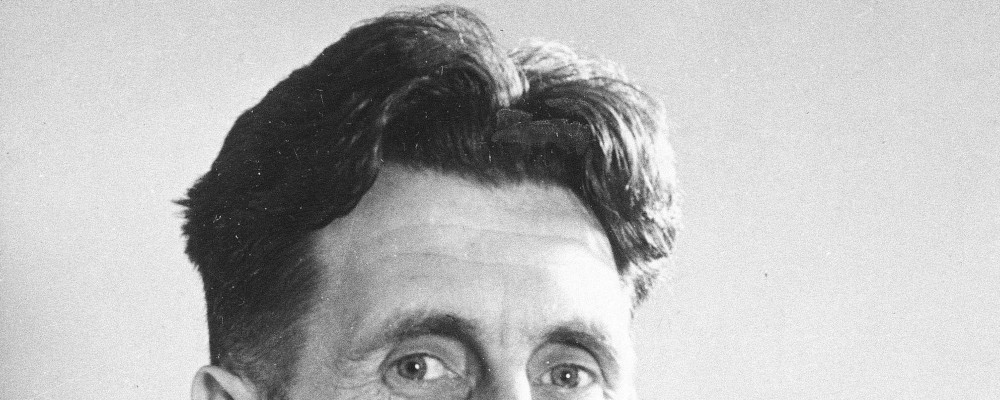Review of: Orwell: The New Life
Author: D. J. Taylor
Publisher: Constable, 2023
After Bernard Crick’s classic biography, George Orwell: A Life (1982), many thought there wasn’t much more to say about Orwell. D.J. Taylor came along and put a lie to that perception. He wrote Orwell: The Life in 2003 and followed that up with his latest book, Orwell: The New Life, after a trove of new letters appeared. We might just be starting to discover how Orwell “quarried his way down into the heart of the human condition and managed to colonize the mental world both of his age and the ones that followed.”
When Orwell died in 1950 at only 46, though he always looked 30 years older, he instructed his estate that no biography should be written. That promise was broken by his second wife and keeper of Orwell’s memory, Sonia Brownell, when Professor Crick convinced her such a book was necessary to keep unauthorized books from distorting his reputation. Crick’s authorized biography stuck closely to Orwell’s public life and ideas. In contrast, Taylor’s books delved deeply into his personal life, which would have appalled Orwell, given his proclivities to keep his private life from public view. Biographers tended to stress his well-meaning and saintly side. Taylor exposes Orwell’s complex inner life and highlights that he had his share of people who detested him, including his brother-in-law, who referred to him throughout his life as “stinking little Eric.”
Contradictions abound in his private life. Orwell (nee Eric Blair) was an anti-colonialist who served as a policeman in Burma but returned after five years. Christopher Hitchens speculates Orwell quit, fearing he would become a debauched colonial officer. Some said he had been seen “prowling the waterfront brothels of Rangoon.”
Eton educated but with a penchant for living with the destitute; a believer in treating each other with decency but slept with young Arab prostitutes from Marrakech; an atheist all his life but insisted on a traditional Christian burial. He referred to gays as pansies who couldn’t pronounce their “Rs.” Taylor speculated that was a symptom of his latent homosexuality. Traditional off-hand antisemitism appears in his work, and significantly in his Down and Out in Paris and London.
Then there is the question of how he treated his first wife, Eileen, who was at Orwell’s side when he needed her, but he was absent when she needed him. She treated his tuberculosis throughout his life and also nursed him back to health from a gunshot wound in Spain. Eileen (nee O’Shaughnessy), educated at Oxford, gave up a promising career when they married. Described as witty and highly intelligent, she disappears as a person in Orwell’s Homage to Catalonia—he refers to her only as his wife. In 1945, she died on the operating table after taking a bus alone to the hospital to remove ovarian tumours while worrying whether she was worth the 50 pounds for the operation. She was only 39. After returning from viewing the ruins in Germany to make funeral arrangements, Orwell quickly proposes to four women looking for a wife to replace Eileen and care for his adopted son, Richard Blair.
Taylor’s book goes beyond his personal life to his political beliefs and limited understanding of economic theory and capitalism. Orwell had read F. A. Hayek’s Road to Serfdom and agreed that collectivism would eventually end in “an inner ring of bureaucrats, who in almost every case will be men who want power for its own sake.” Yet he remained a socialist all his life, believing “that only socialist nations can fight effectively” and that capitalism doesn’t work because it can’t deliver the goods.
Both are extraordinarily false statements. Without turning to socialism, Britain fought and stood alone against Germany. At the same time, America’s capitalist economy became the arsenal for the Allied war effort that eventually exhausted Hitler’s army on the Western Front. He also seemed utterly ignorant of the most famous economist in the world, his countryman John Maynard Keynes, who tried to save capitalism while arguing for a larger role for the state to control destructive business cycles.
Orwell oddly showed little interest in the United States, a country he had never visited, and was always suspicious that America had hidden intentions of inheriting Britain’s colonial possessions. He also resented the “grotesque” pay differences between American and British soldiers that automatically put GIs on par with England’s middle class. One would think Orwell would approve of American fighters earning a decent pay that would appeal to his egalitarian instincts. For all his talk of equality and internationalism, his natural English snobbery was never far away.
Though he wrote much until 1945, it was Animal Farm and Nineteen Eighty-Four that immortalized both his reputation as a writer and thinker—despite the wishes of some on the Left who believed, and hoped, that both books would be quickly forgotten and who never forgave Orwell for exposing the lies of the Russian Revolution. Without those books, he would have disappeared as just an average literary presence between the two world wars.
These books may never have been written if he did not see for himself the second civil war in Spain—the first being the battle between Republicans and Francisco Franco’s reactionary forces to save feudalism, and the other between Stalin’s communists who were killing off other leftist factions, including Trotskyists. Orwell saw that the utopia on the other side of the Urals was a lie and dared to expose it to the world even though it meant eternal enmity from the Left, who accused him of betraying and weakening the fight against fascism.

Orwell today
If alive today, what would Orwell think about our obsession with diversity, inclusiveness, equality, cancel culture, safe spaces, trigger warnings, social media, and intrusions of our privacy by the state and private business? Not much, since he believed in complete freedom of thought and respect for the average citizen’s basic decency and common sense.
Orwell held firmly to the notion that Truth and language mattered. But he feared we were abandoning the idea that history could be truthfully written. He would have been appalled by the toppling of statues and renaming of institutions and street names to cater to the political fashion of the day while reminding us that those who control the past control the future. Today, Room 101 is where we confess our unconscious sins of racism, colonialism, sexual biases, and white privilege. And if that doesn’t work, language laws by the thought police will do the rest.
D.J. Taylor has done his subject a great justice by extricating him from what Hitchens described as “an object of sickly veneration and sentimental overpraise” and showing us the complete person. Even Orwell would agree that saints should always be judged guilty until proven innocent. George Orwell’s greatest gift was to sharpen our skills to the dangers of totalitarian control, whether from the Right or Left. Unfortunately, those skills seem to be slipping away.
Recommended for You

Falice Chin: The ‘wild and weird’ Calgary Stampede

Howard Anglin: Lament for a Lament

‘A place where anybody, from anywhere, can do anything’: The Hub celebrates Canada Day

Ian Holloway: The Supreme Court is ditching its iconic red robes. Yes, it matters




